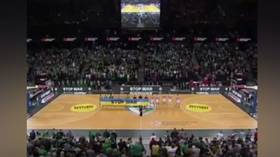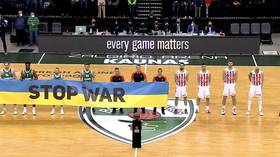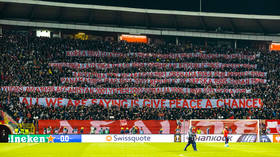Serbian basketball team explains Ukraine flag snub

Serbian basketball club Crvena Zvezda has explained why players refused to line up behind a pro-Ukrainian banner before a recent game in Lithuania, condemning the gesture as a “political spectacle” while detailing “insults” that its players and fans were subjected to.
Players from Crvena Zvezda – also known as Red Star Belgrade – declined to line up behind a banner painted in Ukrainian colors and carrying the message ‘STOP WAR’ before they faced Zalgiris in the EuroLeague on Sunday.
Crvena Zvezda players were loudly booed for their actions while chants of “Glory to Ukraine!” and “F**k Serbia” were heard from the crowd in Kaunas during the game. Ukrainian and NATO flags were also seen in the crowd.
The Serbian club released a statement on Monday detailing its stance and calling out the apparent hypocrisy of their Lithuanian rivals and EuroLeague officials.
“Crvena Zvezda as a sports club and a representative of the Republic of Serbia, which took a clear position on the conflict in Ukraine, follows the official positions of our country,” it said.
“During official communication with the leadership of the EuroLeague and the headquarters of Zalgiris a few days before the match in Lithuania, we were told that any political actions would be prohibited and no one will hold a banner in the colors of any country, as this would make us participants in the manipulation and politicization of humanist slogans.
“Unfortunately, our request not to hold a banner that is not neutral was not granted (perhaps under someone’s pressure), and everything after that was a political spectacle, not a sport, and seriously violated the basic principles of the EuroLeague and basketball.”
Among the Crvena Zvezda players who did not stand behind the Ukraine banner was America’s Aaron White. He later issued a message on Twitter saying the team had been told not to touch the sign, but added he is stanchly against the conflict in Ukraine – a stance which has reportedly seen him criticized by some of the Crvena Zvezda fanbase.
The club’s statement stressed support for White, saying he “unjustifiably came under attack from the public, because he stands for the same values as the club whose colors he wears, and that is peace.”
Crvena Zvezda officials suggested that displaying the pre-game banner could mean that any and every team would be able to resort to politically-charged ceremonies, and also condemned the “provocative” actions of the Lithuanian crowd.
“Should we ask ourselves today, in 2022, why in 1999, during the NATO aggression and the killing of thousands of innocent civilians and children, while the Zalgiris basketball players won this competition, they did not carry the banner ‘Stop the aggression against Yugoslavia’?” the statement asked.
“Following the example of yesterday’s events, can Crvena Zvezda now have the same right to demand from all the players in the matches in Belgrade to carry the banner ‘Kosovo is Serbia’?
“That is why we now have every moral and other right to expect the EuroLeague to act urgently, initiate disciplinary proceedings and adequately sanction this violation of the basic principles and laws of the EuroLeague, and to punish those responsible for politicized and obviously prepared incidents and harassing our team, our fans and insulting our country and our club in Kaunas,” the statement demanded.
All Russian teams have been suspended from the EuroLeague following the military offensive in Ukraine, while international basketball governing body FIBA has also banned all Russian and Belarusian teams and officials from its competitions.
The Crvena Zvezda sporting family has spoken out against those sanctions.
The club’s football fans displayed a banner listing NATO and US military confrontations ahead of a European match in March, and FC Crvena Zvezda general director Zvezdan Terzic said he was “outraged” by sanctions applied to Russian athletes.
“We went through this in 1992. There is anti-Russian hysteria in Europe, politics is unnecessarily interfering in sports,” said Terzic.
“We sympathize with the Ukrainian people and the terrible civilian casualties, but the Russian people are close to the Serbs and always will be.
“Russia is a power that has always been on the Serbian side.”














